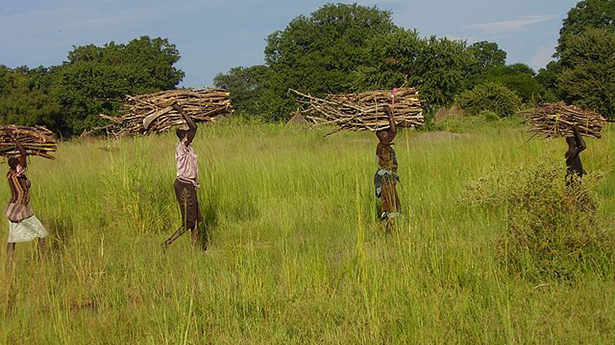It sounds like a brutally disturbing nightmare: Alone in a forest miles from home, a teenage girl fights off a man as he tries to rape her. She flees home in terror, hours on foot, afraid for her life. The next day, the scene repeats itself as she is forced to collect firewood again. Facing her attacker in the forest again, as she must day after day.
For Susan Ozene and countless women outside the city of Yei in battle-scarred South Sudan, this nightmare is more than a bad dream. It is reality.
Why keep going to the forest?
Women in Yei are responsible for gathering firewood that fuels the traditional cooking stoves their families use to prepare food. Since 2013, civil war in the region has forced citizens fleeing violence to re-settle in areas already depleted of resources. Deforestation further plagues the area due to the relentless demand for cooking fuel. So, collecting firewood can take up to five hours, soil erosion is spreading, and trees are disappearing dangerously fast.
Aside from the threats of violence and the environmental toll, collecting fuel means girls spend less time in school and at home. Many young girls are forced to forfeit their education entirely so they can collect firewood. There are health impacts, too: Women who cook with traditional stoves inhale the equivalent of two packs of toxic cigarette smoke every day, making this the second leading health risk for these women and girls behind childbirth.
Safety and solutions in new stoves
That’s why the women-led Forum for Community Change and Development launched a campaign in 2013 to train women in the Yei region to use and build improved cooking stoves. Global Greengrants supported this campaign with a $5,000 grant to train women to use the stoves—and learn why they are better. The new stoves require 75 percent less firewood than traditional stoves so women don’t have to make as many dangerous journeys to the forest.
“Our major purpose of carrying out this project,” says Anne Kyomugisha, the group’s executive director, “was to help reduce gender violence, improve education in the community, and educate women about the importance of the forest and preventing soil erosion.”
For Susan Ozene, and many others in South Sudan, the improved stove has changed the course of her life.
When Kyomugisha’s organization learned of Ozene’s experiences, it enrolled her in counseling and provided her with an improved stove for her family.
“I now use the time I save from going to the forest to do small business so I can buy clothes and food for my family (my auntie, nieces, and my sisters) and pay medical fees,” Ozene says. “I can counsel other vulnerable girls in the community and I hope to go back to school while paying school fees for my son, as well.”
According to Kyomugisha, other women and girls in the community now spend less time in the forest gathering firewood and more time in school and at home. Over 200 women have learned how to use and build the stoves; many have also started to sell them for profit.
Empowered by their skills and understanding of their basic rights as household leaders, these women share their training with their communities and schools. Interest has grown to the point that some project facilities can’t accommodate the number of women who want to participate in trainings. The community is also taking fewer resources from the environment.
We are so impressed by the incredible impact this community group has had in Yei in two short years. We can’t wait to see how far this project will go in the future.
- 4.3 Million=Premature deaths each year from indoor air pollution caused by cooking with solid fuels like firewood (World Health Organization)
- 25 = Percentage of black carbon emissions—which may account for a fifth of the earth’s warming—attributable to residential burning of solid fuel (Global Alliance for Clean Cookstoves)
- 5 = Annual rate, in percent, of deforestation in South Sudan (Environmental Impacts Risks and Opportunities Assessment; the United Nations Environment Programme (UNEP) sites firewood collection as a significant contributing factor)
- 75 = Percentage decrease in the amount of firewood an improved cooking stove requires compared to a traditional stove.
- 900 = Families in the Yei region who will benefit from Forum for Community Change and Development’scurrent cookstove project.
Download Climate Justice and Women’s Rights: A Guide to Supporting Grassroots Women’s Action. And join the conversation by tweeting with us at #WomenAndClimate.
By Julie Dugdale (@julie_dugdale)
Photos from Top: COSV: CC / BY-SA, European Commission DG Echo: CC / BY-SA

